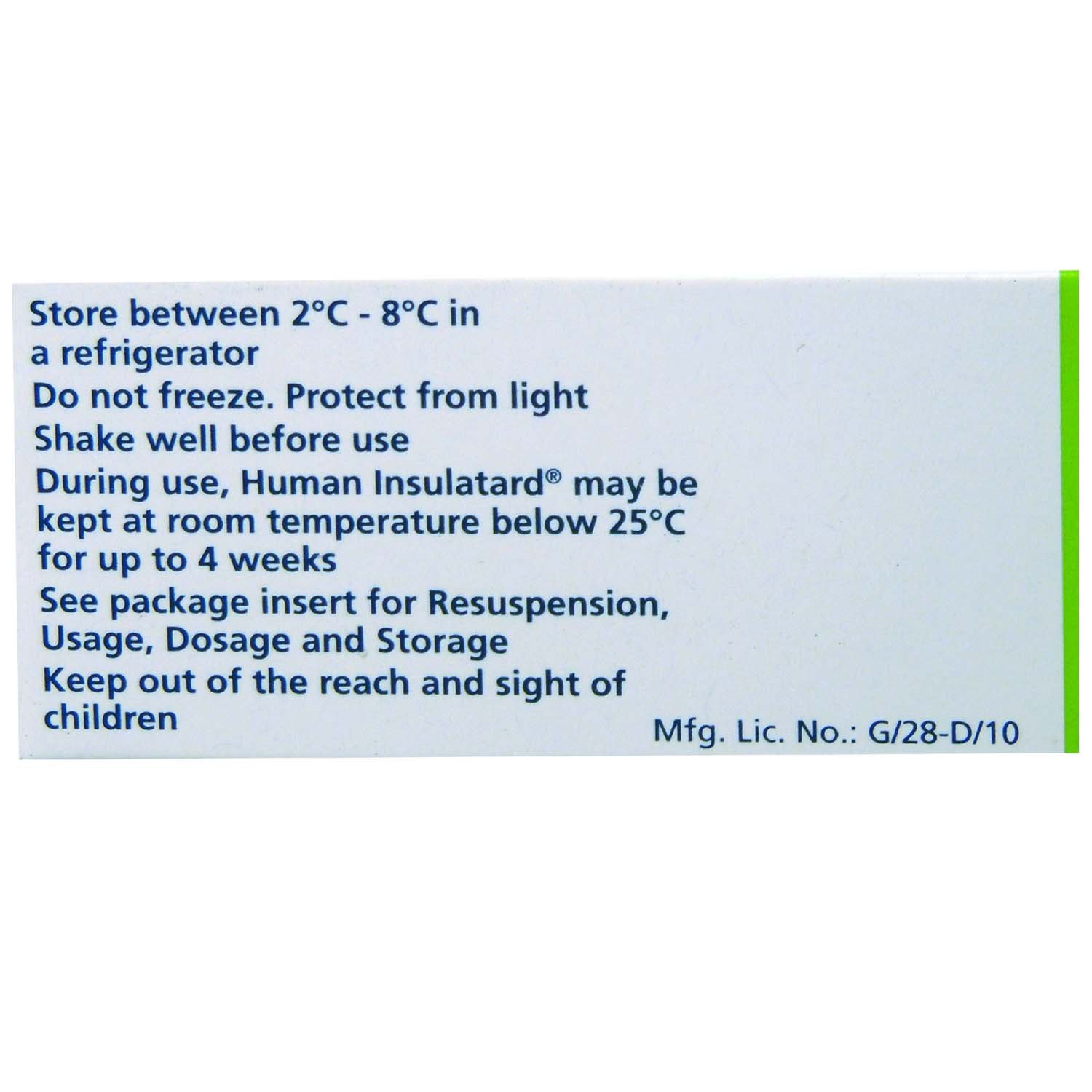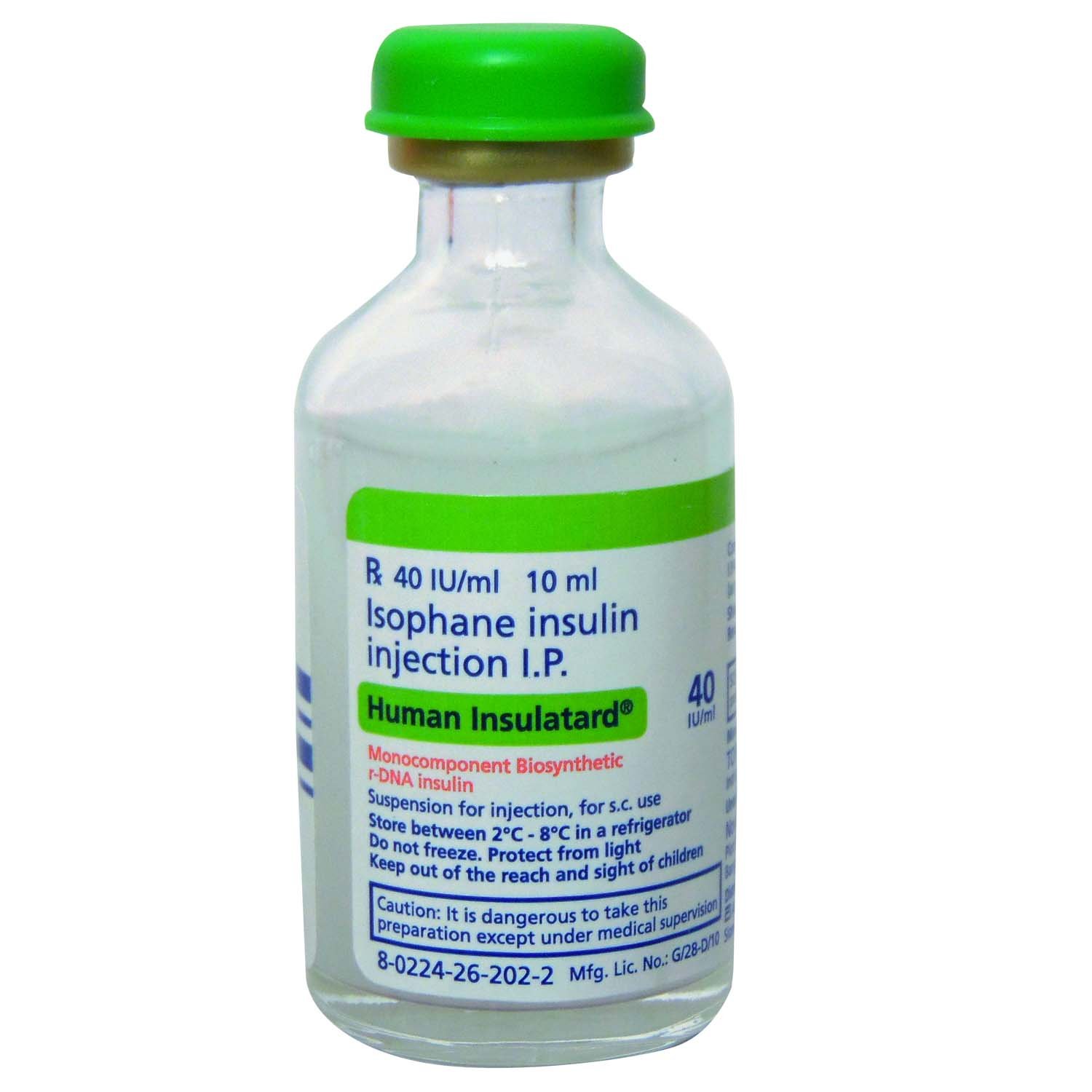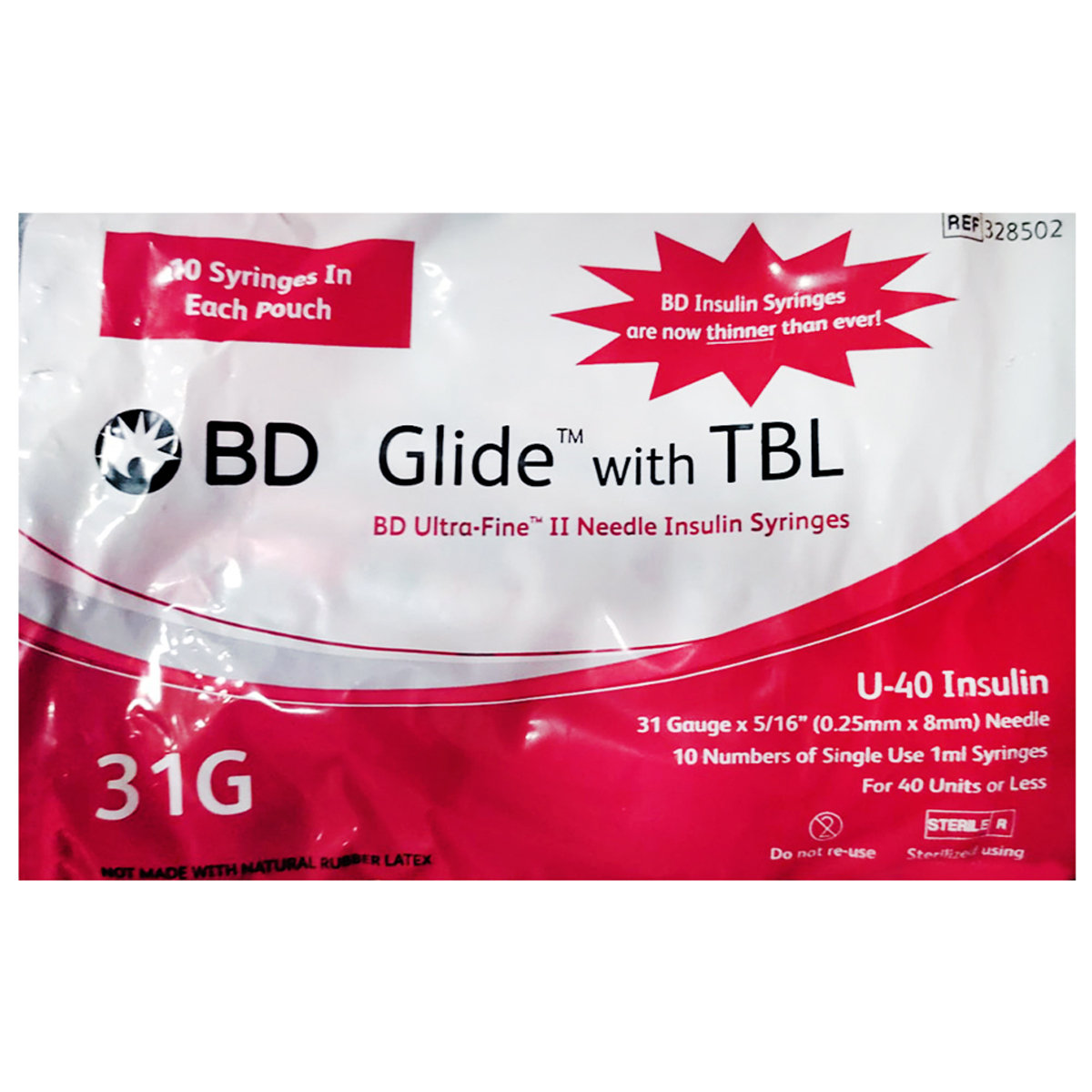Human Insulatard 40IU/ml Suspension for Injection 10 ml
MRP ₹178
(Inclusive of all Taxes)
₹26.7 Cashback (15%)
Provide Delivery Location

secured payment

india's most trusted pharmacy

genuine products
Composition :
Manufacturer/Marketer :
Consume Type :
Expires on or after :
Return Policy :
About Human Insulatard 40IU/ml Suspension for Injection
Human Insulatard 40IU/ml Suspension for Injection contains human insulin, used to improve blood sugar control in adults and children with type 1 and type 2 diabetes mellitus. It maintains blood sugar levels in both adults and children. Diabetes mellitus is a condition that affects the way your body processes glucose. In Diabetes Mellitus Type 1, the body does not make enough insulin to control blood sugar levels. In Diabetes Mellitus type 2, either the body stops producing enough insulin (the hormone which helps to decrease sugar levels in the blood) or there is resistance to the action of insulin. As a result, insulin is produced in large amounts but it is not able to act on the organs of the body.
Human Insulatard 40IU/ml Suspension for Injection works by ensuring rapid and consistent sugar control. Human Insulatard 40IU/ml Suspension for Injection is a fast-acting type of insulin which helps to decrease blood sugar levels after the intake of meals. It prevents the chances of developing serious complications of diabetes. It facilitates the reuptake of sugar in muscle and fat cells and thus, suppresses the production of sugar in the liver.
Your doctor will advise you on how to use this medicine. It is advised to get it administered by a healthcare professional. It should be taken 15 minutes prior to the meal or within 20 minutes after you start having a meal. In some cases, you may experience injection site reactions like redness or swelling. Some people gain weight while taking insulin. You may also experience symptoms of hypoglycemia such as cold sweat, cool pale skin, nervousness or tremor, anxious feeling, unusual tiredness or weakness, confusion, difficulty in concentration, drowsiness, excessive hunger, temporary vision changes, headache, nausea and palpitation. Most of these side effects of Human Insulatard 40IU/ml Suspension for Injection do not require medical attention and gradually resolve over time. However, if the side effects are persistent, reach out to your doctor.
Try not to stop taking this medicine of your own. Let your doctor know about this, as it may cause withdrawal symptoms. Do not take this medicine if you have any low blood glucose levels, kidney, liver or heart problems or problems with alcohol or other prescription recreational drugs. Along with this medicine, you should take a healthy diet, do regular exercise and maintain weight as advised by your doctor. Human Insulatard 40IU/ml Suspension for Injection is a cold chain medicine and so it has to be stored in the refrigerator between 2-8 degrees Celsius else its efficiency may be lost. Do not store in the freezer of the refrigerator.
Uses of Human Insulatard 40IU/ml Suspension for Injection

Have a query?
Directions for Use
Human Insulatard 40IU/ml Suspension for Injection should never be administered intravenously (into the vein). It is administered subcutaneously in the abdomen or thigh region. Take Human Insulatard 40IU/ml Suspension for Injection as advised by the doctor. If you are not well trained to self-administer Human Insulatard 40IU/ml Suspension for Injection, ask a healthcare professional to administer it.
Key Benefits
When you take Human Insulatard 40IU/ml Suspension for Injection, it works by ensuring rapid and consistent sugar control. It facilitates the reuptake of sugar in muscle and fat cells and thus, suppresses the production of sugar in the liver. It helps to decrease blood sugar levels after the intake of meals. It prevents the chances of developing serious complications of diabetes. Besides this, Human Insulatard 40IU/ml Suspension for Injection can be safely prescribed to the diabetic mother in the pregnancy as well as lactation stage. Human Insulatard 40IU/ml Suspension for Injection helps in improving the glycaemic control which in turn decreases the risk of progression of complications of diabetes like damage of retina (retinopathy), damage of kidney (nephropathy), damage of nerve cells (neuropathy), delayed wound healing, diabetic foot ulcer and others.
- If you experience signs of skin allergies such as redness, itching, or irritation after taking medication, contact your doctor right away.
- To alleviate skin allergy symptoms, your doctor may change your medication regimen or offer tailored medication management advice.
- Your doctor may recommend or prescribe drugs to relieve discomfort.
- Cool compresses or calamine lotion can help relieve redness and itching on the afflicted skin area.
- Staying hydrated by consuming plenty of water can help relieve discomfort.
- Monitor your skin condition closely and promptly report any changes, worsening symptoms, or concerns to your healthcare provider.
- Skin rash caused by allergies is due to irritants or allergens. Therefore, avoid contact with such irritants.
- Consult your doctor for proper medication and apply an anti-itch medication. Follow the schedule and use the medication whenever needed.
- Protect your skin from extreme heat and try to apply wet compresses.
- Soak in the cool bath, which gives a soothing impact to the affected area.
Drug Warnings
Human Insulatard 40IU/ml Suspension for Injection is for subcutaneous use only and should never be administered intravenously (IV) or in the veins. If you are changing the brand of insulin, it should be done under strict medical supervision. Cases of heart failure have been reported when pioglitazone was used with insulin especially in patients who are at high risk of cardiac heart failure. The first symptoms of hyperglycaemia (high blood sugar level) may include symptoms like excessive thirst, dry mouth, increased frequency of urination, nausea, vomiting, drowsiness, flushed dry skin, loss of appetite and acetone odour of breath. You should closely monitor these symptoms. Symptoms like heart failure, weight gain and oedema (fluid deposition in tissue) should not be overruled. You are recommended not to consume alcohol as it may increase or decrease your blood glucose level. Care should be taken when you are traveling across more than 2 time zones. Your doctor may adjust your insulin schedule. Human Insulatard 40IU/ml Suspension for Injection may decrease level of potassium leading to state of hypokalaemia that, if left untreated, may lead to respiratory paralysis, irregular heartbeat rhythm, coma and even death. Do not take this medicine if you have any low blood glucose levels, kidney, liver, or heart problems, or problems with alcohol or other prescription recreational drugs.
Drug-Drug Interactions
Drug-Drug Interactions
Login/Sign Up
Coadministration of Gatifloxacin with Human Insulatard 40IU/ml Suspension for Injection 10 ml may sometimes affect blood glucose levels. Both low blood glucose and, less frequently, high blood glucose have been reported.
How to manage the interaction:
Although there is a possible interaction, Human Insulatard 40IU/ml Suspension for Injection 10 ml can be taken with Gatifloxacin if prescribed by the doctor. Consult the prescriber if you experience symptoms such as nervousness, confusion, headache, dizziness, drowsiness, tremors, nausea, hunger, weakness, perspiration, palpitation, rapid heartbeat, increased urination, increased thirst, and increased hunger. Maintaining blood glucose levels is advised.
Taking Human Insulatard 40IU/ml Suspension for Injection 10 ml with ciprofloxacin effects blood glucose levels, which may cause hyperglycemia (high blood sugar) or hypoglycemia (low blood sugar) less frequently.
How to manage the interaction:
Although taking ciprofloxacin and Human Insulatard 40IU/ml Suspension for Injection 10 ml together can possibly result in an interaction, it can be taken if your doctor has prescribed it. However, consult a doctor if you experience headaches, dizziness, sleepiness, anxiety, disorientation, tremors, nausea, hunger, weakness, increased sweating, and a rapid heartbeat, increased hunger, increased thirst. Do not discontinue any medications without consulting a doctor.
Drug-Food Interactions
Drug-Food Interactions
Login/Sign Up
Diet & Lifestyle Advise
Exercise may lower your body’s need for insulin during and for some time after the physical activity.
Exercise may also speed up the effect of an insulin dose, especially if the exercise involves the area of injection site (for example, the leg should not be used for injection just prior to running).
Discuss with your doctor how you should adjust your insulin regimen to accommodate exercise.
Avoid eating sugar food and prefer food cooked food low in calories.
When traveling across more than 2 time zones, you should talk to your doctor concerning adjustments in your insulin schedule.
Habit Forming
Therapeutic Class
All Substitutes & Brand Comparisons
RX
Out of StockLongact 40IU/ml Injection
USV Pvt Ltd
₹72.78
(₹6.55/ 1ml)
63% CHEAPERRX
Out of StockIletin NPH 40IU/ml Injection
Eli Lilly and Company (India) Pvt Ltd
₹90.51
(₹8.15/ 1ml)
54% CHEAPERRX
Out of StockWosulin-N 40IU/ml Suspension for Injection
Wockhardt Ltd
₹157.58
(₹14.18/ 1ml)
20% CHEAPER
Alcohol
Safe if prescribed
You are recommended not to consume alcohol along with Human Insulatard 40IU/ml Suspension for Injection to avoid unpleasant side-effects. Alcohol may either decrease or increase the blood sugar level which can be fatal.
Pregnancy
Consult your doctor
Please inform your doctor if you are pregnant as a dose adjustment may be required. The amount of insulin you need usually falls during the first three months of pregnancy and increases for the remaining six months.
Breast Feeding
Consult your doctor
Please inform your doctor if you are breastfeeding as a dose adjustment may be required.
Driving
Safe if prescribed
Drive with caution, Human Insulatard 40IU/ml Suspension for Injection usually causes drowsiness and affects driving ability. Your ability to concentrate and react may be reduced if you have hypoglycaemia (low blood sugar).
Liver
Consult your doctor
Human Insulatard 40IU/ml Suspension for Injection to be taken with caution, especially if you have a history of liver diseases/conditions. The dose may have to be adjusted by your doctor.
Kidney
Consult your doctor
Human Insulatard 40IU/ml Suspension for Injection to be taken with caution, especially if you have a history of kidney diseases/conditions. The dose may have to be adjusted by your doctor.
Children
Safe if prescribed
Human Insulatard 40IU/ml Suspension for Injection can be given safely to children provided, dose has to be prescribed by a child specialist.
FAQs
If you use more than recommended dose of Human Insulatard 40IU/ml Suspension for Injection, your blood sugar may become low (you feel dizzy and drowsy). Please inform your doctor immediately and do as advised to avoid any unpleasant side effect.
If you use less Human Insulatard 40IU/ml Suspension for Injection than you should, your blood sugar levels may increase. Please check your blood sugar. And also, do not inject a double dose to make up for a forgotten/missed dose.
Yes, Human Insulatard 40IU/ml Suspension for Injection can cause oedema (e.g. swelling in arms, ankles; fluid retention), specially at the start of insulin therapy or during a change in therapy to improve control of your blood glucose. If it persists, please consult your doctor.
Human Insulatard 40IU/ml Suspension for Injection can be given to treat both the condition of type 1 and type 2 diabetes mellitus. However, your doctor will decide whether Human Insulatard 40IU/ml Suspension for Injection can be given to you or not depending on your present condition. Human Insulatard 40IU/ml Suspension for Injection should be avoided in patients who are allergic to Human Insulatard 40IU/ml Suspension for Injection or other forms of insulin. It should be avoided in patients suffering from low potassium level (hypokalemia), moderate to severe kidney disease or liver disease. Inform doctor if you are pregnant or breastfeeding.
Human Insulatard 40IU/ml Suspension for Injection shows its effect within half an hour after you take it. It shows maximum effect between 1-4 hours after you take and its effects lasts up to 24 hours. But the effect may change from person to person, consult your doctor for further information.
Human Insulatard 40IU/ml Suspension for Injection is a cold chain medicine which has to be stored 2-8 degree celsius only else its efficiency of reducing blood glucose level declines. Do not keep inside the freezer. So, if it is not stored between 2-8 degree celsius its efficiency may decrease.
Yes, you should inform your doctor before travelling specially when travelling to a different time zone as dose adjustment may be required.
Human Insulatard 40IU/ml Suspension for Injection should not given into the veins or intravenously (IV) route. It should be only administered in the subcutaneous region below the skin. Abdomen regions (stomach) is the best site for the injecting Human Insulatard 40IU/ml Suspension for Injection. However, you can also inject Human Insulatard 40IU/ml Suspension for Injection in the upper arm, or thigh region, as suggested by your doctor.
Yes. Prolonged administration of Human Insulatard 40IU/ml Suspension for Injection may lower your potassium level. So, close monitoring of potassium level is required. So, it is advisable to have regular medical test of potassium level.
Country of origin
Manufacturer/Marketer address
Disclaimer
Keep Refrigerated. Do not freeze.Prepaid payment required.









